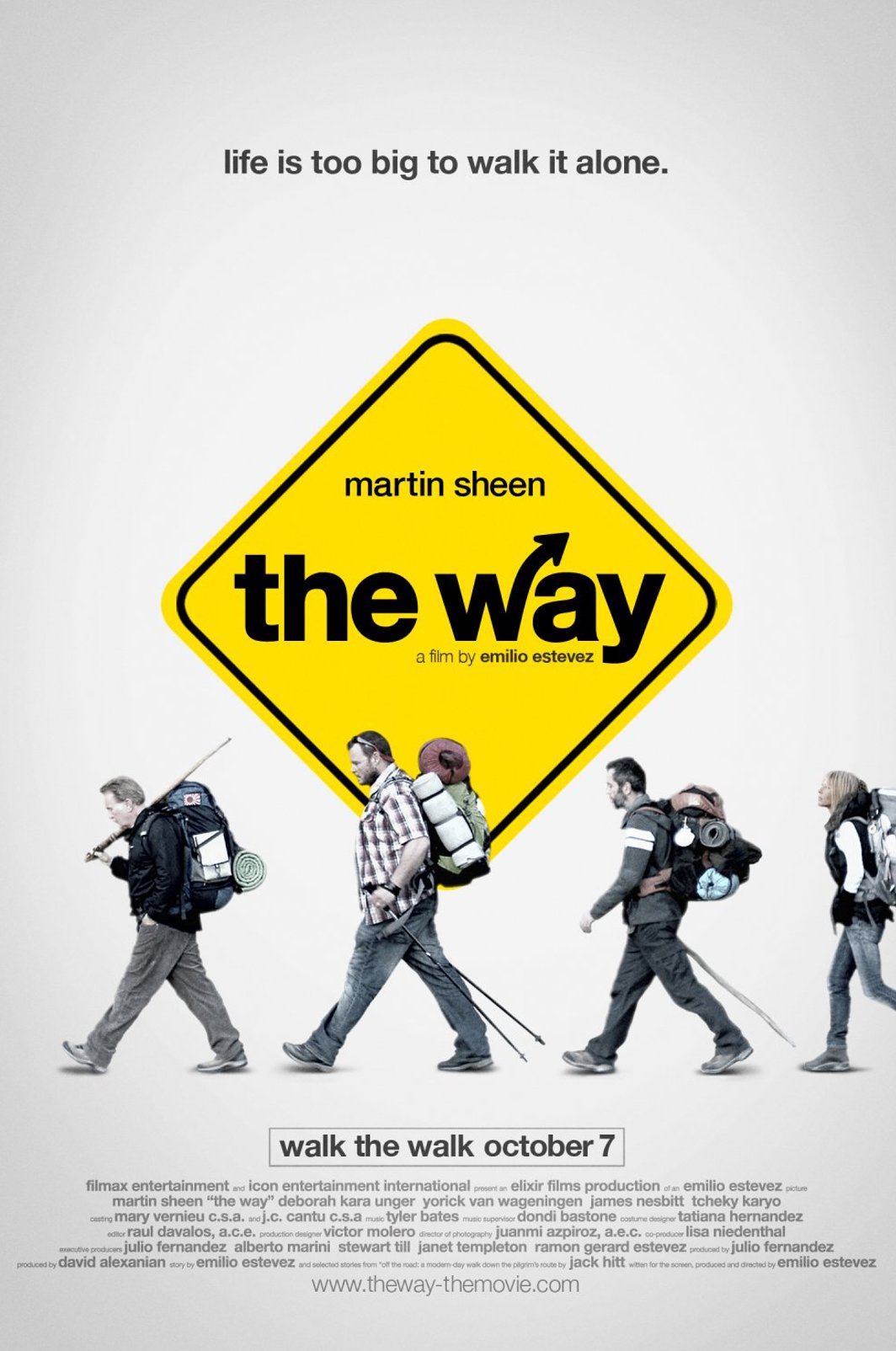Martin Sheen’s and Emilio Estevez’s The Way opened in 15 cities, and will open on 500 screens on October 21. On Saturday I went to Washington to see it; I highly recommend it, but be prepared for an emotional roller coaster.

It is never too late to find the way.
I made the 500 mile trek of the Camino de Santiago from St Jean Pied-du-Port to Santiago de Compostela in the fall of 2010. I wrote of my experience in “The Way of St. James” in the September / October 2011 issue of Touchstone and in these blogs: (here, here, and here).
Sheen had been there in the fall of 2009 making the film (the trailer).
The plot as summarized in the Boston Herald:
Martin Sheen, Estevez’s father and the father of Charlie Sheen, plays an aging American optometrist named Tom.
After the sudden death of Tom’s wayward son Daniel (Estevez) in a freak mountain storm on the pilgrimage to Compostela, a shaken Tom goes to St. Jean Pied du Port, France, to retrieve the body. Instead, he has the remains cremated and decides to complete the journey in his son’s memory and carry Daniel’s ashes with him.
Along “The Way,” Tom, who can be both gruff and magnetic, picks up companions also seeking something — enlightenment, forgiveness, weight loss, smoking cessation.
Among them are Dutch stoner Joost (Yorick van Wageningen of “The New World”), Sarah (Deborah Kara Unger), a sexy and tart-tongued fellow American who plans to quit smoking at journey’s end, and Jack (James Nesbitt), a suspiciously theatrical Irish author who claims to have writer’s block, although he never shuts up.
There are some obvious cinematic references to The Wizard of Oz and also to Sheen’s life and family difficulties, but the film does capture the experience of the Camino, or at least the intense parts of the experience.

Emilio Estevez could have made a film about a traditional Catholic making the Camino, but it would have been less accessible to a general audience, and it would also have been a lot less interesting. The four characters who make the Camino together are trying to ignore God – but then why are they walking 500 miles on a Way that constantly reminds them of Him? And in any case, God is not ignoring them, as becomes clear.

The film, like the Camino, and like life, is full of pain and heart-wrenching grief that will not be healed until God wipes the tears from every eye. But the Camino is also full of joy and laughter. It is is very physical – muddy boots, blisters, wet clothing, aching shoulders – but also drinking glasses of red wine on sunny afternoons while looking over just-harvested wheat fields, and all, both the pains and the small pleasures, shot through with hints of transcendence. Jesus healed the blind with his spit, and healed a women who but touched his garment. And the blood and water flowing from his pierced side brought life to a dying universe.

Above all the Camino is about community – the little community of the four characters, of the fellow pilgrims on the Camino who are always doing small acts of kindness, of the Spaniards who are forever directing wandering pilgrims to the right path and greeting them with a Buen Camino, of the dead who have walked the Camino in the past millennium – and of the saints in heaven, whose statues look down from a thousand church portals.And above stands the cross, whose arms open everywhere a pilgrim looks, giving an abrazo to the whole world.
The film is intense at times but is varied with the wonderful, odd, and funny things that also make up the Camino. I didn’t stay in the dormitories – I had read of the world class snorers who frequented them, so I missed the opportunity to get to know people better – but my short conversations and brief interactions with the locals gave me a flavor for what others were experiencing a with greater depth.

One aspect of the Camino that is difficult to capture in a film is the lesson in patience, in ploddingness, in taking time for the small details. As an American male, for the first few hours of the first day I was annoyed when anyone, especially a woman, passed me, but I reminded myself this was not a race. I also stopped whenever my shoes needed adjusting – a half-hour delay in retying a shoe might mean days of misery from a blister. I also walked for hour after hour through the Kansas-like fields of the Meseta, hearing nothing but my own footsteps and seeing nothing but wheat for almost the entire day. God is in the intense moments, but He is also in the quiet performance of duty, one step after another, hour after hour, day after day, week after week. As Teresa of Ávila said, También anda Dios en la cocina, entre los pucheros – God walks among the pots and pans. But that is hard to show in a 2 hour film.
Ultreya!
